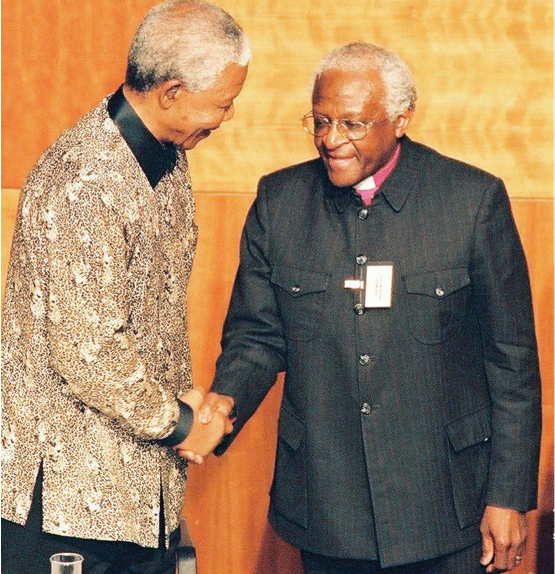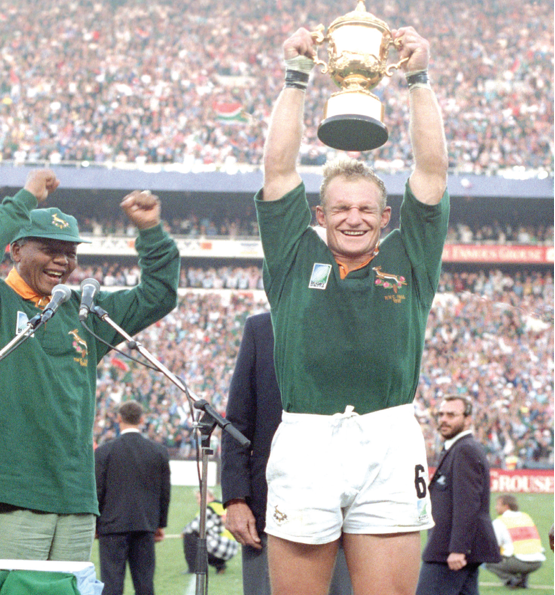Nation building
The inauguration of the late former President Nelson Mandela, adoption of the Constitution, establishment of the Truth and Reconciliation Commission (TRC) and 2010 FIFA World Cup. These are just some of the events South Africans will never forget.
 They rank among the defining moments in the country’s democratic history that have contributed to nation building and social cohesion.
They rank among the defining moments in the country’s democratic history that have contributed to nation building and social cohesion.
Nation building and social cohesion is when societies with different origins, histories, cultures, religions and languages come together.
The Constitution was established to remove the divisions of the past and to create a united society. Adopted in 1996, it is the highest law in the land and promotes a non-racial, non- sexiest society and improved quality of life for all South Africans.
The Constitution calls on government to respect, protect, promote and fulfil the rights of every citizen as stated in the Bill of Rights. Equally, all South Africans are also bound by the duties and responsibilities of citizenship. Establishing the Constitution and its commitment to promote human rights was one the greatest achievements ever recorded in the country’s 20 years of democracy.
But despite the establishment of the Constitution, South Africans could not prosper in an environment still rife with anger, intolerance, pain and feelings of worthlessness inflicted during apartheid. As a solution, the Truth and Reconciliation Commission (TRC) was established in 1995.
Chaired by Archbishop Desmond Tutu, the TRC was a court-like body set up by government to help South Africans who were previously victimised. Anybody who felt they had been a victim of violence could approach the TRC to be heard. Through this platform, numerous stories of grief, pain and resentment were shared and bridges of forgiveness and reconciliation built.
The mandate of the commission was to bear witness to and record crimes relating to human rights violations and in some cases grant amnesty to those responsible for these crimes. The TRC also facilitated reparation or compensation to victims and their families.
The commission had three specific tasks: to discover the causes and nature of human rights violations in South Africa between 1960 and 1994; to identify victims with a view to pay reparations; and to allow amnesty to those who fully disclosed their involvement in politically motivated human rights violations. Four resolutions were identified by the TRC, which included a final reparation - a once-off individual grant of R30 000 paid out to victims; medical benefits and other forms of social assistance; community rehabilitation; and the establishment of symbols and monuments. The Department of Justice and Constitutional Development oversaw the implementation of the TRC's recommendations. According to the department, 21 769 citizens were eligible to receive final reparations by the TRC, yet only 16 837 beneficiaries applied for this. Forty-two beneficiaries are still undergoing legal processes to be paid out and 13 outstanding beneficiaries have been declared untraceable. As part of the medical benefits, victims and their families received free health services.
A Missing Persons Task Team was also established by the National Prosecuting Authority (NPA) in 2004, to conduct investigations into cases of people who had disappeared in political circumstances between 1960 and 1994. Victim’s families also received a once-off grant of R17 000 for a reburial or R8 500 for a symbolic burial. To date, 91 remains of missing persons have been exhumed and 67 families have received the exhumed remains.
The department also assists families with, among others, applications for special pensions and once-off reparation grants where applicable, counselling by the Freedom Park Inter-Faith Committee and the Department of Social Development, and applications for South African identity documents for children of victims born outside the Republic of South Africa during the conflict period from 1960 to 1994.
While the Constitution and TRC has had a major role in nation building, the role of sport in uniting the country is equally important.

From 1994, Sport and Recreation South Africa jumped onto the nation-building wagon by constructing 744 sport and recreational facilities across the country. The impact that sport has had on nation building was proven in 1995 when South Africans of all races united in supporting the Springboks who won the 1995 Rugby World Cup.
The Springbok’s biggest supporter was the then President Mandela who walked onto the field wearing the Springbok jersey bearing the number of the Springbok captain Francois Pienaar.
Since then, sport has been used as a tool to unite communities and diverse groups in fair competition and recreational fun. Heightening social cohesion was the 2010 FIFA World Cup, when South Africa welcomed the world as it played host to the first-ever soccer world cup held on African soil.
Government stepped up its social cohesion efforts by hosting the first-ever National Cohesion Summit in 2012 and the National Cohesion Strategy was developed. A nation- wide campaign was launched and government officials interacted with communities to hear the challenges they faced.
Despite the challenges the country faces with regards to social cohesion, one factor has continued to unite the nation over the years – a shared love for former President Mandela.
Over the years South Africans of all walks have come together to celebrate his release from prison, his inauguration as President and his birthdays – setting aside time for community service in his honour.
More recently, former President Mandela united the country and the world as everyone collectively grieved his death. While he may no longer be around, Madiba will always be South Africa’s greatest unifier



 Facebook
Facebook Twitter
Twitter WhatsApp
WhatsApp